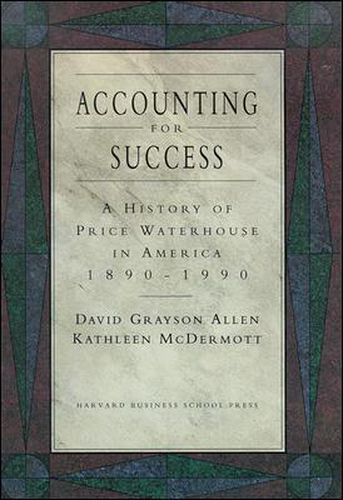Readings Newsletter
Become a Readings Member to make your shopping experience even easier.
Sign in or sign up for free!
You’re not far away from qualifying for FREE standard shipping within Australia
You’ve qualified for FREE standard shipping within Australia
The cart is loading…






Set firmly within the larger context of American business history, Accounting for Success traces the evolution of the century-old accounting firm of Price Waterhouse (PW). Allen and McDermott divide Price Waterhouse’s history into three distinct periods. The first part (1890 to the mid-1920s) covers the establishment of the American outpost of a British parent and the Americanization of its practice. The second (the next 40 years) highlights PW’s rise to professional leadership and the important role played by the audit. The third (the 1970s and onward) focuses on PW’s response to the challenges brought about by the globalization of the economy, heightened competition among firms and the growth of non-audit services. The authors also address six central themes that recur throughout PW’s history: the importance of the partner; the significant role played by the law in shaping the accounting profession’s rights and responsibilities; the changing nature of accounting services; the continuously evolving and complex business environment; the role played by PW’s leadership; and PW’s worldwide approach to its business.
$9.00 standard shipping within Australia
FREE standard shipping within Australia for orders over $100.00
Express & International shipping calculated at checkout
Set firmly within the larger context of American business history, Accounting for Success traces the evolution of the century-old accounting firm of Price Waterhouse (PW). Allen and McDermott divide Price Waterhouse’s history into three distinct periods. The first part (1890 to the mid-1920s) covers the establishment of the American outpost of a British parent and the Americanization of its practice. The second (the next 40 years) highlights PW’s rise to professional leadership and the important role played by the audit. The third (the 1970s and onward) focuses on PW’s response to the challenges brought about by the globalization of the economy, heightened competition among firms and the growth of non-audit services. The authors also address six central themes that recur throughout PW’s history: the importance of the partner; the significant role played by the law in shaping the accounting profession’s rights and responsibilities; the changing nature of accounting services; the continuously evolving and complex business environment; the role played by PW’s leadership; and PW’s worldwide approach to its business.